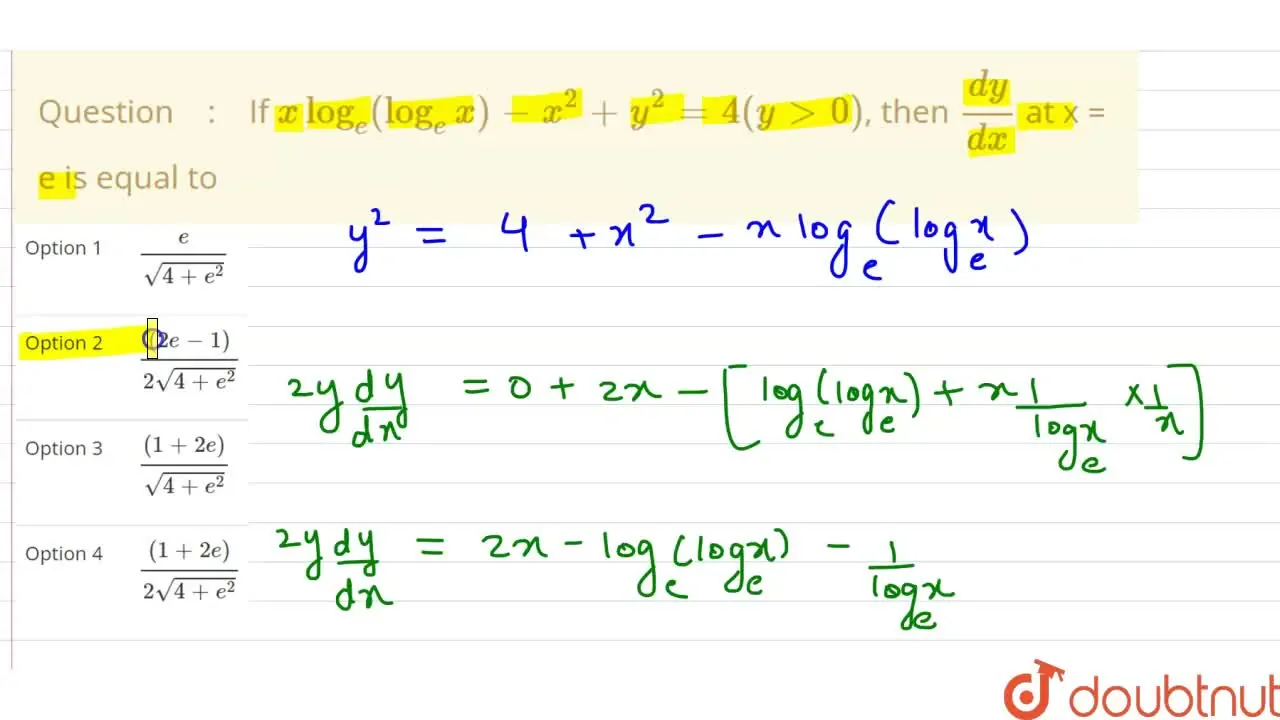If xloge(logex)−x2+y2=4(y>0), then dydx at x = e is equal to
A
e√4+e2
B
(2e−1)2√4+e2
C
(1+2e)√4+e2
D
(1+2e)2√4+e2
Video Solution
Text Solution
The correct Answer is:B
We have, xloge(logex)−x2+y2=4, which can be written as
y2=4+x2−xloge(logex) …(i)
Now, differentiating Eq. (i) w.r.t. x, we get
2ydydx=2x−x1logex⋅1x−1⋅loge(logex)
[by using product of derivative]
⇒ (dydx)=2x−1logex−loge(logex)2y ....(ii)
Now, at x=e,y2=4+e2−eloge(logee)
[using Eq. (i)]
=4+e2−eloge(1)=4+e2−0
=e2+4
⇒ y=√e2+4 [∵y>0]
∴ At x=eandy=√e2+4,
dydx=2e−1−02√e2+4=2e−12√e2+4 [using Eq. (ii)]
|
Updated on:21/07/2023
Related Playlists
- BOOK - IIT JEE PREVIOUS YEARCHAPTER - LIMIT,CONTINUITY AND DIFFERENTIABILITY EXERCISE - Differentiation (Fill in the Blanks)7videos
LIMIT,CONTINUITY AND DIFFERENTIABILITY
- BOOK - IIT JEE PREVIOUS YEARCHAPTER - LIMIT,CONTINUITY AND DIFFERENTIABILITY EXERCISE - Differentiation (Analytical & Descriptive Questions)9videos
LIMIT,CONTINUITY AND DIFFERENTIABILITY
- BOOK - IIT JEE PREVIOUS YEARCHAPTER - LIMIT,CONTINUITY AND DIFFERENTIABILITY EXERCISE - Differentiability at a point (Integer Answer Type Questions)3videos
LIMIT,CONTINUITY AND DIFFERENTIABILITY
- BOOK - IIT JEE PREVIOUS YEARCHAPTER - JEE MAINSEXERCISE - All Questions1videos
JEE MAINS
- BOOK - IIT JEE PREVIOUS YEARCHAPTER - MATRICES AND DETERMINANTSEXERCISE - SOLVING SYSTEM OF EQUATIONS (INTEGER ANSWER TYPE QUESTION)2videos
MATRICES AND DETERMINANTS
Similar Questions
If x log(logx)−x2+y2=4(y>0), then dydx at x = e is equal to
View SolutionIf y=logax then dydxatx=e is
View SolutionIf y =elogx,thendydx
View SolutionIf xloge(logex)−x2+y2=4(y>0),thendy/dx at x=e is equal to
View SolutionIf y = sin (logex), then x2d2ydx2+xdydx is equal to
View SolutionIf y=etanx(lnsinx) then dydx is equal to
View SolutionIf y=log(cosex), then dydx=
View SolutionIf y= elog(logx),thendydx =
View SolutionIf Y=log[Sec(ex2)] then dydx is equal to
View SolutionIf y=logex(logx),thendydx
View Solution


